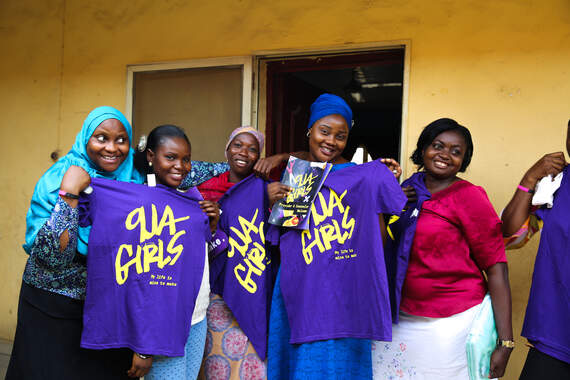The Adolescents 360 program, led by Population Services International (PSI), aims to increase the uptake of and perception of modern contraceptives and reduce unintended pregnancies among girls in Nigeria, Ethiopia, and Tanzania.
When a girl walks into a 9ja Girls (pronounced “Naija”) space, she feels emboldened. Inside, amidst affirming notes from girls, glittery walls, and caring health workers, she can learn a new trade, have an honest Q&A about her body and feelings, and even take up a contraceptive method—all of this discreetly and on her terms.

Unbeknownst to her, the space is one of many potential safe spaces. Even though every 9ja Girls space feels extremely personal and personalized, they’re part of a modular, easy-to-replicate interior design system that can be integrated into unused rooms in existing public and private clinics.

9ja Girls was conceived, alongside young people and a consortium of partners including IDEO.org, to increase the uptake of modern contraceptives and reduce unintended pregnancies among girls in Nigeria.
Early on, the IDEO.org team realized they needed to create a space where girls felt absolutely safe. In Nigeria, there’s a widespread belief that contraception—outside the confines of marriage—leads to promiscuity and even infertility. Girls want to learn more about their bodies and sexual health but have no one to trust. Meanwhile, providers often lack knowledge of methods or impose their personal beliefs, like abstinence first, onto customers.

Before arriving at the 9ja Girls solution, IDEO.org prototyped two different brand experiences to understand what girls care about—one focused on learning skills to gain financial independence; the other on love and health, a space where girls could anonymously ask questions about life.
The team learned that many girls who dreamed of finishing school or learning a trade were drawn in by the idea of gaining financial independence through vocational skills classes. But it was the conversations about love and health that made girls want to stay. They had so many questions—about everything from what to do if they are raped, what changes to their body during their periods mean, and what steps they could take today to achieve their dreams. For many, this was first time they had access to a safe space and a cohort of trained healthcare providers for answers.
Beyond appealing to girls, community acceptance creates the enabling environment necessary for girls to access services. The brand played a major role in getting the health workers and the community at large to buy in. The tagline, “My life is mine to make,” which is accompanied by a mantra, celebrates making decisions about life as well as the physical act of making or crafting. Self efficacy and self confidence are intimately linked. This mantra resonated with the providers so much that they turned it into a song used to kick off and close every session.
My life is
mine to make.
My heart may break,
but I won’t fake.
My body is mine,
no one can take.
I’m a 9ja Girl.
I’m awake.

The brand’s bold and loud visual language celebrates life, love, and health—imagine a girl pouring her purse out on the table, and everything she needs to be successful is right there. By orienting programming around skills training, rather than contraceptive access, parents and community members can easily support adolescent girls; and girls can participate without fear of stigma.
Beyond the name, “9ja,” slang for “Nigeria,” has collective and individual ethos. A young girl, a provider, or a Ministry of Health employee can say with confidence: “I’m a 9ja Girl too.”








